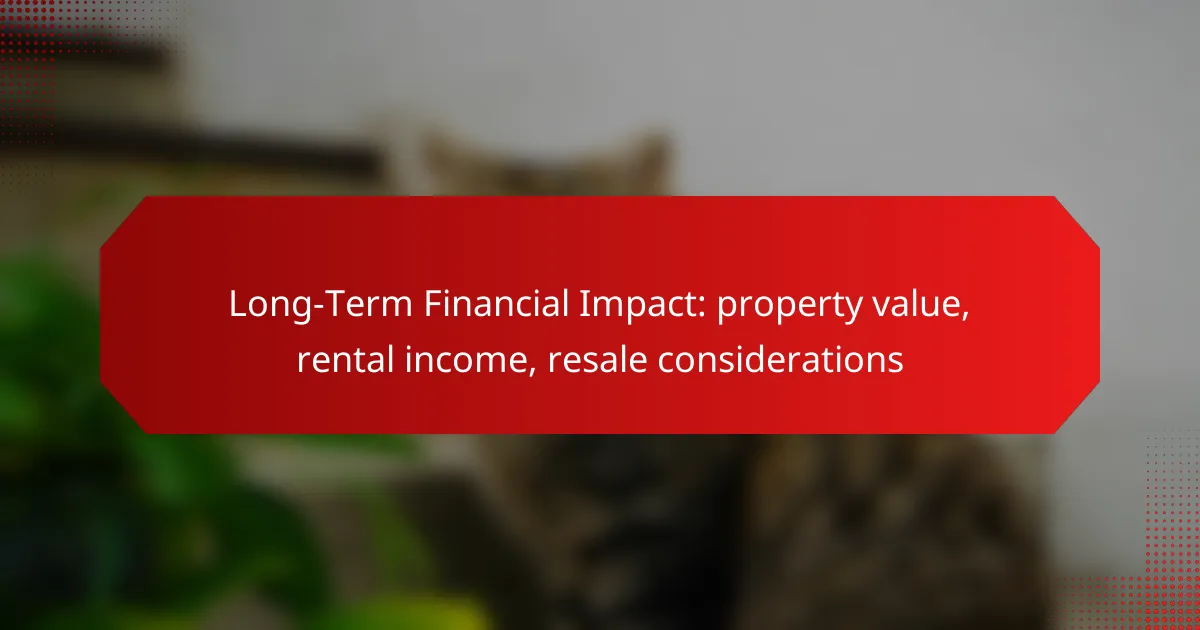The long-term financial impact of property investment is largely determined by property value, which affects rental income, resale prices, and overall investment returns. In the UK, higher property values can lead to increased equity and financial stability, while rental yields typically range from 3% to 8% based on various factors. Additionally, resale considerations are essential for maximizing profits and making informed investment decisions.

How does property value impact long-term financial outcomes in the UK?
Property value significantly influences long-term financial outcomes in the UK by determining potential rental income, resale prices, and overall investment returns. Higher property values typically lead to increased equity and greater financial stability over time.
Market trends in UK property values
Market trends in UK property values fluctuate based on economic conditions, interest rates, and buyer demand. In recent years, many regions have experienced steady appreciation, while others may see stagnation or decline. Staying informed about these trends can help investors make timely decisions.
For instance, areas with strong job growth and infrastructure development often see faster property value increases. Monitoring indices such as the UK House Price Index can provide insights into these trends.
Factors influencing property appreciation
Several factors influence property appreciation, including economic growth, interest rates, and local amenities. Economic stability generally leads to higher property values, while rising interest rates can dampen demand and slow appreciation. Investors should consider these factors when evaluating potential properties.
Additionally, properties with desirable features, such as modern amenities, energy efficiency, and proximity to schools or transport links, tend to appreciate more quickly. Understanding these criteria can guide investment choices.
Impact of location on property value
Location plays a crucial role in determining property value, with urban areas typically commanding higher prices than rural locations. Factors such as safety, access to public transport, and local schools significantly affect desirability and, consequently, property values.
For example, properties in London often have much higher values compared to those in smaller towns, reflecting the demand and economic opportunities available. Investors should assess location-specific factors to make informed decisions about potential investments.

What is the potential rental income from UK properties?
The potential rental income from UK properties varies significantly based on location, property type, and market conditions. Investors can generally expect rental yields to range from around 3% to 8%, depending on these factors.
Average rental yields in major UK cities
In major UK cities, rental yields can differ widely. For instance, London typically sees lower yields, often around 3% to 5%, due to high property prices. In contrast, cities like Manchester and Liverpool may offer yields between 6% and 8%, making them attractive for investors seeking better returns.
Here’s a quick comparison of average rental yields in selected cities:
- London: 3% – 5%
- Manchester: 6% – 8%
- Liverpool: 6% – 8%
- Birmingham: 5% – 7%
Factors affecting rental income
Several factors influence rental income, including property location, demand, and local amenities. Properties in desirable neighborhoods with good transport links and schools tend to attract higher rents.
Additionally, the type of property matters; for example, family homes may yield different returns compared to studio apartments. Market conditions, such as economic trends and housing supply, also play a critical role in determining rental income potential.
Long-term rental market trends
Long-term trends indicate a growing demand for rental properties in urban areas, driven by factors such as population growth and changing lifestyles. Many people are opting to rent rather than buy, which can stabilize or increase rental income over time.
However, potential investors should be aware of regulatory changes, such as rent control measures or changes in taxation, which could impact profitability. Staying informed about these trends is essential for maximizing rental income in the long run.

How do resale considerations affect property investments?
Resale considerations play a crucial role in property investments, influencing both the timing of sales and the potential return on investment. Understanding these factors can help investors maximize their profits and make informed decisions about their properties.
Timing the market for resale
Timing the market is essential for optimizing resale value. Investors should monitor market trends, economic indicators, and seasonal patterns to identify the best times to sell. Generally, selling during a seller’s market, characterized by high demand and low inventory, can yield better prices.
It’s also important to consider local factors, such as upcoming infrastructure developments or changes in zoning laws, which can affect property values. Keeping an eye on these trends can help investors decide when to list their properties for sale.
Costs associated with selling property
When selling property, various costs can impact the net proceeds from the sale. Common expenses include real estate agent commissions, which typically range from 5% to 6% of the sale price, closing costs, and potential repairs needed to make the property market-ready.
Investors should also factor in taxes, such as capital gains tax, which may apply if the property has appreciated significantly. Understanding these costs upfront can help in setting realistic expectations for the sale price and net profit.
Impact of renovations on resale value
Renovations can significantly influence a property’s resale value, but not all improvements yield the same return. Focus on upgrades that appeal to buyers, such as kitchen and bathroom remodels, which often provide the highest return on investment, typically ranging from 60% to 80% of the renovation cost.
However, it’s crucial to avoid over-improving a property beyond the neighborhood standards, as this can lead to diminishing returns. Conducting a cost-benefit analysis before undertaking renovations can ensure that the investments made will enhance the property’s marketability and value.

What criteria should investors consider for property investment?
Investors should focus on property value, potential rental income, and resale considerations when evaluating property investments. These criteria help determine the long-term financial impact and overall viability of the investment.
Key metrics for evaluating property investments
When assessing property investments, key metrics include the capitalization rate, cash flow, and return on investment (ROI). The capitalization rate, calculated by dividing net operating income by the property value, helps gauge profitability. Aim for a cap rate between 5% and 10% for a balanced investment.
Cash flow is crucial; it reflects the income generated after expenses. Positive cash flow indicates that the property is generating income, while negative cash flow may signal potential issues. Aiming for a cash flow that covers at least 1.25 times the mortgage payment is a good rule of thumb.
Lastly, consider the ROI, which measures the gain or loss relative to the investment cost. Aiming for an ROI of 10% or higher is generally favorable for long-term investments.
Importance of location and amenities
Location significantly impacts property value and rental income potential. Properties in desirable neighborhoods with access to schools, public transport, and shopping tend to appreciate faster and attract higher rents. Research local market trends to identify up-and-coming areas.
Amenities also play a crucial role in attracting tenants and buyers. Properties with features like parking, outdoor spaces, and modern appliances can command higher rents and resale values. Consider investing in properties that offer desirable amenities to enhance their appeal.
Additionally, be aware of local regulations that may affect property investments, such as zoning laws and rental restrictions. Understanding these factors can help you make informed decisions and maximize your investment’s long-term potential.

How do economic factors influence property investment decisions?
Economic factors significantly impact property investment decisions by affecting property values, rental income, and resale potential. Investors must consider interest rates, economic stability, and market trends to make informed choices that align with their financial goals.
Impact of interest rates on property values
Interest rates play a crucial role in determining property values. When interest rates are low, borrowing costs decrease, making it easier for buyers to finance property purchases, which can drive up demand and subsequently increase property values.
Conversely, when interest rates rise, borrowing becomes more expensive, potentially leading to reduced demand and lower property values. Investors should monitor interest rate trends and consider their potential impact on both current investments and future purchases.
Effects of economic downturns on rental income
Economic downturns can significantly affect rental income, as higher unemployment rates and reduced consumer spending often lead to increased vacancy rates. Landlords may need to lower rents to attract tenants, which can diminish cash flow and overall profitability.
During such periods, it is essential for property investors to maintain a financial buffer and consider flexible leasing options to retain tenants. Diversifying rental properties across different markets can also help mitigate risks associated with economic fluctuations.

What are the emerging trends in the UK property market?
The UK property market is currently influenced by several emerging trends that shape property value, rental income, and resale considerations. Key trends include the growth of sustainable housing, the impact of remote work on property demand, and technological advancements in property management.
Growth of sustainable housing
Sustainable housing is becoming increasingly popular in the UK, driven by a growing awareness of environmental issues and government initiatives. Properties that meet energy efficiency standards and utilize renewable energy sources often command higher prices and attract environmentally conscious buyers and renters.
Investors should consider properties with features such as solar panels, energy-efficient appliances, and sustainable materials. These elements not only enhance property value but can also lead to lower utility costs for tenants, making them more appealing in the rental market.
Impact of remote work on property demand
The shift towards remote work has significantly altered property demand in the UK. Many individuals are seeking homes with dedicated office spaces and larger living areas, often in suburban or rural locations, as they prioritize comfort and functionality over proximity to city centers.
This trend can lead to increased property values in previously less desirable areas, while urban properties may experience stagnation or decline. Investors should assess the changing preferences of potential tenants or buyers when considering property purchases or developments.
Technological advancements in property management
Technological advancements are transforming property management in the UK, making it more efficient and user-friendly. Tools such as property management software, virtual tours, and online rental platforms streamline processes for landlords and tenants alike.
Landlords should leverage these technologies to enhance tenant experiences and improve operational efficiency. For instance, adopting digital payment systems can facilitate timely rent collection, while virtual tours can attract a wider audience, ultimately impacting rental income and property value positively.
